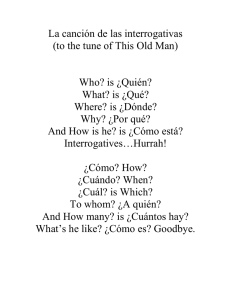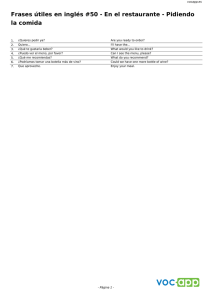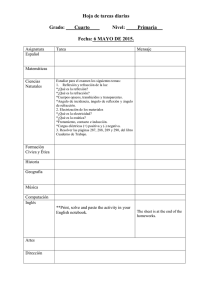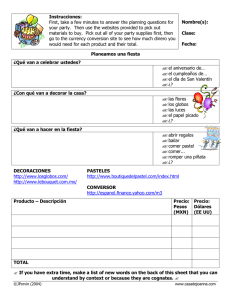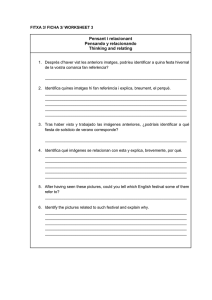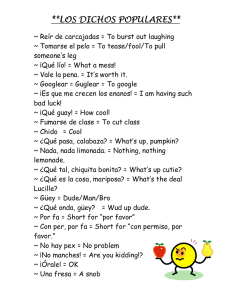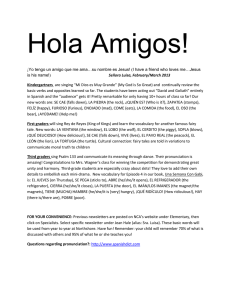FINAL (SEND IT OR LEAVE UNDER MY DOOR NO LATER THAN
Anuncio
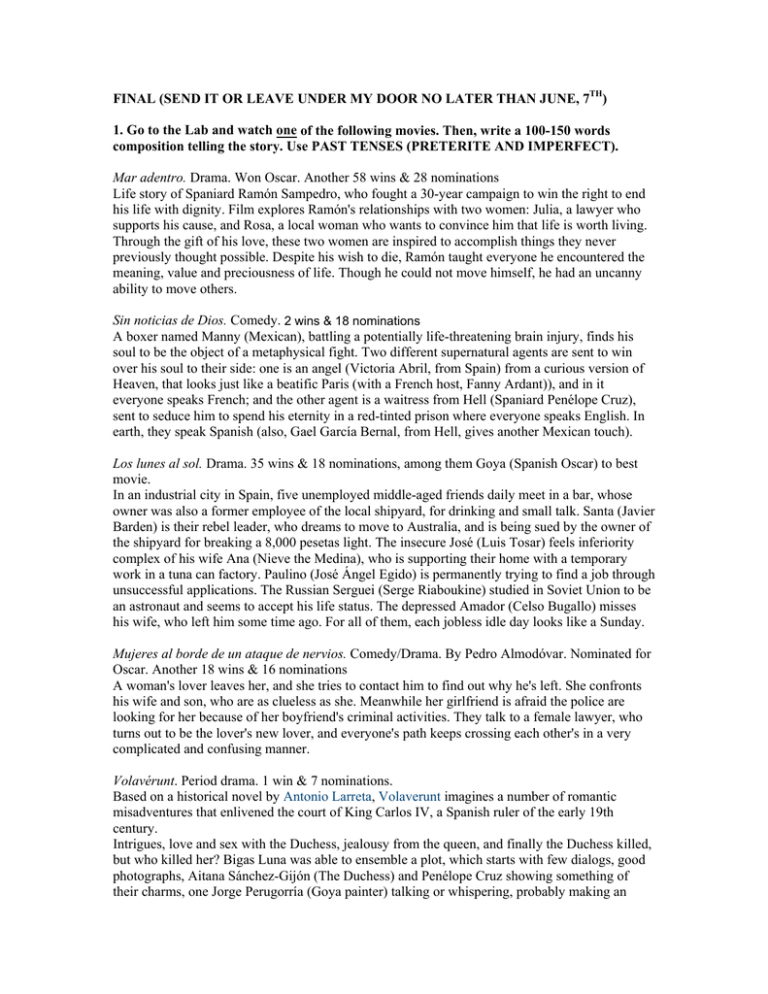
FINAL (SEND IT OR LEAVE UNDER MY DOOR NO LATER THAN JUNE, 7TH) 1. Go to the Lab and watch one of the following movies. Then, write a 100-150 words composition telling the story. Use PAST TENSES (PRETERITE AND IMPERFECT). Mar adentro. Drama. Won Oscar. Another 58 wins & 28 nominations Life story of Spaniard Ramón Sampedro, who fought a 30-year campaign to win the right to end his life with dignity. Film explores Ramón's relationships with two women: Julia, a lawyer who supports his cause, and Rosa, a local woman who wants to convince him that life is worth living. Through the gift of his love, these two women are inspired to accomplish things they never previously thought possible. Despite his wish to die, Ramón taught everyone he encountered the meaning, value and preciousness of life. Though he could not move himself, he had an uncanny ability to move others. Sin noticias de Dios. Comedy. 2 wins & 18 nominations A boxer named Manny (Mexican), battling a potentially life-threatening brain injury, finds his soul to be the object of a metaphysical fight. Two different supernatural agents are sent to win over his soul to their side: one is an angel (Victoria Abril, from Spain) from a curious version of Heaven, that looks just like a beatific Paris (with a French host, Fanny Ardant)), and in it everyone speaks French; and the other agent is a waitress from Hell (Spaniard Penélope Cruz), sent to seduce him to spend his eternity in a red-tinted prison where everyone speaks English. In earth, they speak Spanish (also, Gael García Bernal, from Hell, gives another Mexican touch). Los lunes al sol. Drama. 35 wins & 18 nominations, among them Goya (Spanish Oscar) to best movie. In an industrial city in Spain, five unemployed middle-aged friends daily meet in a bar, whose owner was also a former employee of the local shipyard, for drinking and small talk. Santa (Javier Barden) is their rebel leader, who dreams to move to Australia, and is being sued by the owner of the shipyard for breaking a 8,000 pesetas light. The insecure José (Luis Tosar) feels inferiority complex of his wife Ana (Nieve the Medina), who is supporting their home with a temporary work in a tuna can factory. Paulino (José Ángel Egido) is permanently trying to find a job through unsuccessful applications. The Russian Serguei (Serge Riaboukine) studied in Soviet Union to be an astronaut and seems to accept his life status. The depressed Amador (Celso Bugallo) misses his wife, who left him some time ago. For all of them, each jobless idle day looks like a Sunday. Mujeres al borde de un ataque de nervios. Comedy/Drama. By Pedro Almodóvar. Nominated for Oscar. Another 18 wins & 16 nominations A woman's lover leaves her, and she tries to contact him to find out why he's left. She confronts his wife and son, who are as clueless as she. Meanwhile her girlfriend is afraid the police are looking for her because of her boyfriend's criminal activities. They talk to a female lawyer, who turns out to be the lover's new lover, and everyone's path keeps crossing each other's in a very complicated and confusing manner. Volavérunt. Period drama. 1 win & 7 nominations. Based on a historical novel by Antonio Larreta, Volaverunt imagines a number of romantic misadventures that enlivened the court of King Carlos IV, a Spanish ruler of the early 19th century. Intrigues, love and sex with the Duchess, jealousy from the queen, and finally the Duchess killed, but who killed her? Bigas Luna was able to ensemble a plot, which starts with few dialogs, good photographs, Aitana Sánchez-Gijón (The Duchess) and Penélope Cruz showing something of their charms, one Jorge Perugorría (Goya painter) talking or whispering, probably making an effort to avoid his Cuban accent, Jordi Mollà as a lover and powerful minister, and Italian Stefania Sandrelli, no matter how old she is, as a queen, and also a lover. The excitement really starts after mid film, and more than a drama it becomes a good thriller. Therefore do not miss anything from the first part of the film if you want to understand what really is going on. Moreover the film indicates how the famous paint of Goya "La Maja Desnuda" was done and what source the painter used. Certainly it was not the Duchess' body but the one of a nice gypsy lady, Pepita Tudó (Penélope Cruz), very "maja" by the way, we would say in Spanish. 2. Reading and questions about Spain (answers in Spanish). ¿Cómo es el gobierno de España? ¿Cuándo llegaron los primeros humanos a la Península Ibérica (Iberian Peninsula = Spain + Portugal? ¿Quiénes fueron los primeros pobladores (historical people) de la Península? ¿Cuándo llegaron los romanos y cuánto se quedaron (how long they stayed)? ¿Cuántos emperadores romanos fueron españoles (= Spaniards)? ¿Cuándo llegaron los visigodos? ¿Decayó (declined) el interés por la cultura clásica? ¿Impactaron mucho los visigodos (=germanos) en la Península? ¿Cuándo llegaron los árabes o musulmanes (=arabs, muslims) a España? ¿Cuál era la ciudad más rica y sofisticada en la Edad Media? ¿En qué año se conquistó o capturó el último remanente musulmán? ¿Qué más cosas sucedieron ese año? ¿Cuándo fue España el poder dirigente en Europa (the leading power) y uno de los más grandes imperios del mundo? ¿Cuándo declinó este imperio y por qué? ¿Qué es la Guerra de la Independencia? ¿Cuándo hubo (there was) una guerra con los Estados Unidos? ¿Qué tierras perdió España? ¿Cuándo hubo una guerra civil? ¿Qué es el “milagro español” (Spanish miracle)? ¿Qué cosas trajo (brought) la Segunda República? ¿Cuándo tuvimos un rey otra vez? ¿Cuándo empezaron a usar (started to use) el Euro? ¿Qué quiere decir que España es un Estado de Autonomías? ¿Qué tres climas hay en España? ¿Qué lugar ocupa (place in worldwide economy) en la economía mundial? ¿Cuál es el porcentaje de emigrantes europeos que hay en España? ¿Dónde viven? ¿Qué lugar ocupa en cuanto a la inmigración? ¿Qué puedes decir de las identidades? ¿Con qué se identifican los habitantes de España? ¿Qué otras lenguas son oficiales, aparte del español? ¿Cita dos palabras que tenemos en español y son visigóticas (germanas), dos del árabe, dos de las lenguas nativo americanas y dos de préstamos modernos. ¿Cuál es el porcentaje de alfabetización (=literacy)? ¿Cuántos años se necesitan para obtener una licenciatura (university degree) ¿Qué necesitas para entrar en la Universidad en España (see Qualifications)? Di algo (tell something) acerca de (about) los alumnos extranjeros y las escuelas bilingües.
